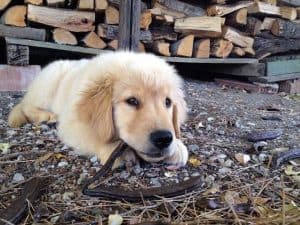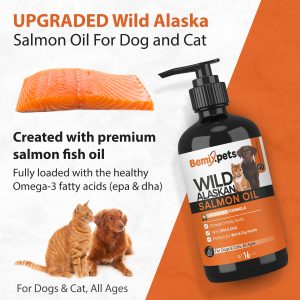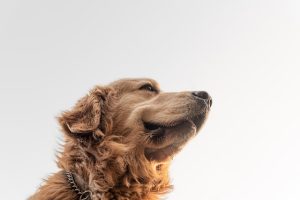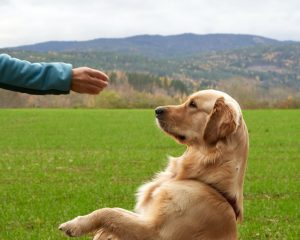You are having a little snack or tossing some leftover cooked bones in the trash. And there is your Golden Retriever giving you the most pitiful, begging look ever. Sometimes it is okay to give in to this look, as long as the foods you give are not toxic to your dog. Here is a list of foods that you should never feed your Golden Retriever, or any dog.
Contents
Cooked Bones
Cooking a bone can make it brittle. This will make the bone more likely to splinter in your dog's gut. Those splinters can penetrate the gut lining and reck all kinds of havoc. Usually, this ends with a worried owner, a dog is a great pain, and a large vet bill. Feeding your dog raw bones is just fine, though.
While you can't feed those cooked bones to your dog you could make them into bone broth. Bone broth is a great way to use cooked bones. You can use bone broth to make soups, sauces, stews, beverages, and, yes, you can share bone broth with your dog!
Chocolate
I think most of us know that chocolate is a potentially toxic thing to feed to our dogs. In fact, as little as 1oz of milk chocolate per pound of your dog is very toxic. This is because chocolate contains caffeine (more on this later) and theobromine. Baking cocoa, unsweetened chocolate, and dark chocolate have the highest concentrations of theobromine. It is found in milk and white chocolate too. It's best to avoid letting your Golden get any chocolate, you don't want her to develop a taste for it.
Coffee, Tea, and Caffeine in General
Why is caffeine bad for dogs? I mean don't they need it to get going in the morning as so many humans do? Well, no they don't. Caffeine is a stimulating compound and can overexcite a dog's system. Caffeine can cause irregular heartbeat, diarrhea, vomiting, seizures, and death in dogs. As little as 110-120mg of caffeine per kg of dog is toxic to them. As a reference point, there is 91mg of caffeine is an 8oz cup of coffee. So, be sure to keep your precious Golden Retriever away from coffee beans, coffee grounds, brewed coffee, tea, tea leaves, energy drinks, caffeinated soda, caffeinated medications, and anything else containing caffeine.
Alcohol
Excess alcohol isn't good for anyone. All the same, effects that alcohol can have on people, it has on dogs. Vomiting, inhibited motor function, nervous system impairment, liver damage, coma, and death are all possibilities when your dog is allowed to consume alcohol. It takes very little alcohol to have this effect on dogs. They are much smaller than people so the effects are greater. So, if you are having a party with alcohol and your dog is around, be sure to keep them safe. The last thing you want is your party ending with your dog having a seizure or worse.
Grapes, Raisins, Wine
No one really knows why grapes and grape products are toxic to dogs, but they are. If a 60-pound Golden Retriever eats 2oz of raisins that is enough to cause sudden kidney failure. If a dog eats 0.3oz of grapes or 0.05oz of raisins per pound of bodyweight it will cause kidney failure. Again, it's best to just avoid grapes, raisins, grape juices, wine, and anything containing grapes.
Xylitol
Xylitol is becoming a popular sweetener for humans because it is a zero-carb, zero-calorie sweetener. It has been showing up in gums, candies, sodas, toothpaste, and other products. It seems to be just fine for us humans, but not for dogs.
Insulin is released when a dog eats sugar or carbs. This is a good thing and helps to reduce blood sugar. However, when a dog consumes zero-carb xylitol their body still releases insulin. This creates a dangerously low blood sugar which can result in vomiting, fatigue, loss of coordination, seizures, and liver failure. These negative effects can take place with as little as 50mg of xylitol per pound of dog.
High-Salt Foods
Salt is a good and natural part of the body it is needed for many body functions. Too much salt can result in salt poisoning. If your dog consumes 4g of salt per kg of dog, it is lethal. Lesser amounts, that are too much, can cause diarrhea, vomiting, seizures, tremors, and kidney damage. Keep your dog safe from high-salt foods like table salt, soy sauce, and playdough. Also, be sure to provide your dog with lots of freshwater if you visit the ocean. If your dog consumes too much ocean water that can also result in salt poising.
Yeast Dough
If you enjoy the process of making yeast bread and rolls at home then you could have another potentially dangerous ingredient in your home. Dangerous to dogs that it. If a dog consumes yeast dough or yeast the yeast will expand in your dog's digestive tract. The least amount of damage you can expect is discomfort and gas. The worst that can happen is that the dog's stomach will twist, bloat or the dough could go as far as to rupture his intestine. These could be life-threatening. Yeast also, created alcohol as it rises. As we have already learned, alcohol has its own set of toxic effects. Best keep your dough rising in a place where your dog cannot get it.
Macadamia Nuts
If your dog consumes 2.2g of macadamia nuts per kg of his body weight he is likely to become sick. Macadamia nuts cause weakness, vomiting, tremors, and hyperthermia, as well as, affecting the nervous system. Dog's intolerance to these nuts seems to vary quite a lot, however, it is best to just avoid letting your dog get any.
Pits
The pits of fruits usually contain toxins that shouldn't be eaten by dogs or humans. The pits of fruit: cherries, avocados, apricots, plums, peaches, should not be given to your dog. Apple seeds should also be avoided.
Human Vitamins, Supplements, and Medications
Human medications, vitamins, and supplements are typically meant for 150lb humans. If your 65 or 75lb Golden Retriever gets a hold of your meds it could make him very sick. Not only the side effects of those meds but also overdosing on them. That said, some supplements made for people can be used for dogs. Just be sure to adjust the dose to fit your dog and not a 150lb human. It's a good idea to work with your holistic vet if you want to give your dog a human supplement.
Raw Salmon, Raw Wild Boar
While dogs can thrive on a diet of raw meat there are a couple of exceptions. Raw wild boar and raw salmon often contain parasites that can be fatal to your dog. Cooking these meats will kill the parasites. So, if you want to feed your dog wild boar or salmon, it is best to cook it first.
Peanut Butter
Peanuts contain aflatoxins which have been linked to cancer in dogs. Not only that, but peanut butter can also harbor added sugars or worse some are made with xylitol! Peanut butter is also high in omega-6 fatty acids which most dogs do not need. Too much omega-6 fatty acids can cause inflammation which is the root cause of most diseases.
Sugar and Other High Carb Items
Dogs are carnivores and thrive on meat and fat. Honestly, they don't even need to eat carbs and sugar at all. Their bodies have the ability to make any sugar that they may need from the amino acids they consume form meat. So, it would make sense to limit carbs and sugars. Feeding large amounts of carbs and sugars (most kibbles are very high-carb) can lead to many health issues. These health problems can include obesity, diabetes, autoimmune disease, heart disease, dementia, joint pain, dental issues, inflammation, the list goes on and on. Indeed the preferred energy source of cancer cells is sugar and carbs. Most cancers cannot use protein or fat as energy, only sugar. A small number of carbs now and then may be helpful for your dog. However, limiting the carbs and sugars your dog eats can prevent a whole host of health problems. It is best to eliminate grains, legumes, potatoes, and sugars from your dog's diet.
Tobacco, Marijuana, Hops
All of these items are not appropriate for your dog. They can cause vomiting, abnormal heartbeat, and death, among other symptoms. Please, also be aware of second-hand smoke, this too can damage your dog. Marijuana can have some health applications, but if you want to give those health benefits to your dog choose a high-quality CBD oil. Be sure the CBD oil is made for pets and has zero THC. THC can be lethal to dogs.
Summary
There are lots of things that we might enjoy or think that would dog might enjoy. But a lot of these foods can be toxic and deadly to our canine friends. It's a good idea to keep a print up of foods toxic to dogs on your refrigerator. Then you can reference it whenever you need to, to keep your Golden Retriever safe.






Leave a Reply
You must be logged in to post a comment.